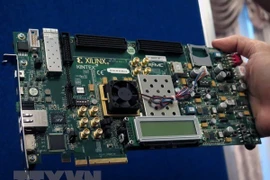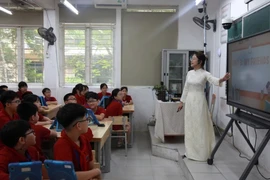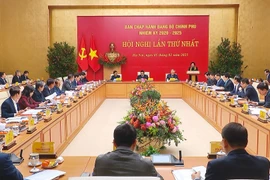Hanoi (VNA) - The National Innovation Centre (NIC), in collaboration with the Ministry of Planning and Investment and Google, organised a seminar on November 15 to explore the potential of artificial intelligence (AI) and discuss policies and mechanisms for its development in Vietnam.
In his opening remarks, Deputy Minister Do Thanh Trung said that the ministry has submitted the human resources development programme for the semiconductor industry until 2030 with a vision to 2050 to the Prime Minister for approval. The programme aims to train at least 5,000 AI engineers and specialists by 2030, supporting Vietnam's growing semiconductor industry.
The ministry has tasked the NIC with collaborating with domestic and international partners to establish a centre for AI training, research, and application. This centre will support AI startups, research, and specialised AI training, with a target of training 7,000 AI experts to international standards and nurturing around 500 AI startups by 2030.
At the event, Google presented its economic impact report themed "Driving digital growth in Vietnam with Google", which highlighted the significant economic potential of AI. According to Google’s research, AI could contribute an estimated 1.89 trillion VND (79.3 billion USD) to the country's economy by 2030, or nearly 12% of its GDP.
To fully harness the potential of AI, Google’s AI Opportunity Agenda for Vietnam report suggests the country strengthen its innovation infrastructure, build a workforce ready to optimise AI, and increase AI accessibility across the economy. The report also provides detailed strategies to bridge the digital and AI knowledge gaps, helping Vietnam's workforce leverage AI effectively to spur economic growth. It stresses the importance of retaining and developing local talents by expanding access to digital education and increasing business training programmes.
The report concludes that to maximise AI's economic benefits, Vietnam must focus on developing a skilled digital workforce. Addressing the digital skills gap through specialised training and technology application will unlock significant economic opportunities for the country.
In addition, Google outlined its current contributions to Vietnam's businesses, households, and workforce through AI-powered products and services such as Google Search, Google Ads, Google Play, YouTube, Google Cloud, and Google Workspace.
Andrew Ure, Managing Director of Government Affairs and Public Policy for Southeast Asia at Google, highlighted that with its young, tech-savvy population and dynamic digital landscape, Vietnam is well-positioned to seize the opportunities AI offers. He said that his company is eager to partner with NIC to introduce the first-ever “AI Policy & Skilling Lab” in Vietnam, and look forward to collaborating with the government, ministries, and research organisations to build an AI-driven future that benefits everyone.
The seminar also featured discussions from experts across government agencies, research institutions, and businesses, who proposed specific solutions to encourage investment in AI research and development. These included building a high-quality AI workforce, developing an AI innovation ecosystem, and fostering an environment where AI ideas can be nurtured and realised.
Another key topic discussed was the need for a comprehensive legal framework for AI to ensure its safe, responsible, and ethical development and application in Vietnam./.
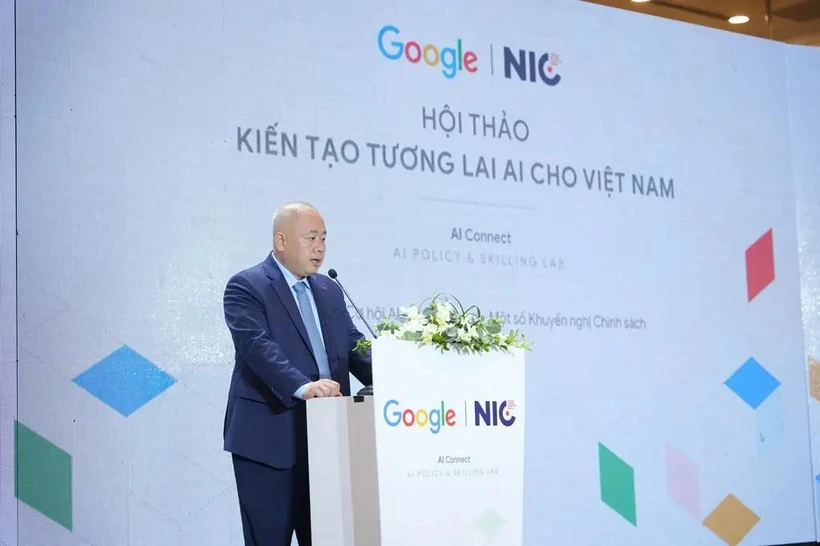
See more

Vietnam races to bridge talent gap amidst global tech innovation
Vietnam has faced a formidable challenge in developing international-standard AI talent, requiring an urgent need for quality over quantity in technical education.

Vietnam hailed as destination for AI development in 2025
Vietnam’s flexible approach to AI regulations has enabled the country to leverage its geopolitical advantages, skilled workforce, and innovation ecosystem for sustained technological progress.
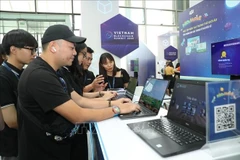
OV intellectuals offer solutions for national sci-tech development
Vietnam is among the top 10 countries in terms of blockchain adoption, interest, understanding, and discussion. The application and development of blockchain technology play a crucial role in building advanced digital infrastructure, ensuring data security and reliability, and laying a foundation for developing the digital technology industry.

More tools released to protect children online
The Ministry of Information and Communications has issued the Code of Conduct on Child Protection in the Internet Environment, aiming to establish standards of language and behaviour for users and promote a safe, healthy, and civilised cyber environment.

AI could help Vietnam improve productivity, speed up development
Asus surveys have shown the majority of users, once familiar with AI, can improve their productivity significantly.
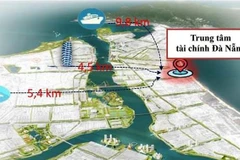
Da Nang targets 5 fintech firms with trillion-dong revenue
The central city of Da Nang aims to have at least five FinTech companies with annual revenue exceeding 1 trillion VND (over 39.8 million USD), with a target of 2-3 FinTech companies per 1,000 residents.
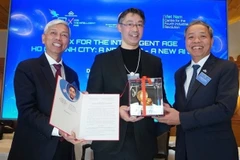
Vietnamese initiative aims to establish world's first AI city
Ho Chi Minh City, in collaboration with Vietnamese technology company CMC, has announced an ambitious initiative to establish the world's first AI city model.
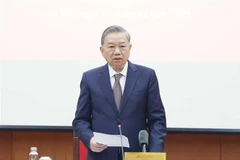
Party chief chairs 1st meeting of steering committee for science, technology development
Party General Secretary To Lam chaired the first meeting of the Central Steering Committee for the Development of Science, Technology, Innovation and Digital Transformation in Hanoi on January 20.

Innovation – key for unlocking door to growth: insiders
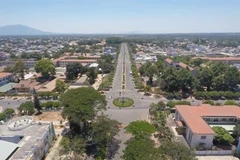
Dong Nai to house research centre for nuclear science, technology
A detailed plan for a Nuclear Science and Technology Research Centre in Dong Nai province’s Long Khanh city will be developed, according to a recent official document approved by the provincial People’s Committee.

Da Nang opens Software Park 2
The central city of Da Nang officially opened its newly-built Software Park No 2, which will provide working space for 6,000 IT engineers and investors in semiconductor industries and micro chip design.

Abbott's life-changing tech Lingo wins 2025 innovation award
Abbott has won an innovation award for Lingo, its first consumer biowearable over-the-counter device to empower people in improving overall health and wellness.

Coc Coc Browser serves nearly 10 billion website visits in 2024
Vietnam’s homegrown web browser Coc Coc facilitated nearly 10 billion website visits in 2024, with each user visiting 67 websites throughout the year.
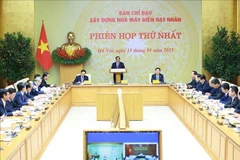
PM chairs first meeting of steering committee for nuclear power plant construction
Prime Minister Pham Minh Chinh, who is also chairman of the steering committee for nuclear power plant construction, presided over the committee's first meeting in Hanoi on January 15.

Can Tho vies for Top 10 ranking in Vietnam's digital transformation
The Mekong Delta city of Can Tho has recently issued a plan, backed by a 150 billion VND (over 5.9 million USD) budget, to position itself as one of the 10 most digital-savvy localities in the country.

Venezuelan Vice President hails Vietnam's sci-tech development determination
Vietnam’s newly-issued resolution on making breakthroughs in science-technology development, innovation, and digital transformation reflects the strategic vision of Vietnam’s Party and Government in the context of strong global transformation driven by the Fourth Industrial Revolution.

Vietnamese scientists discover new snail species in world’s largest cave
Vietnamese scientists have discovered a new snail species in Son Doong Cave within the Phong Nha - Ke Bang National Park in the central province of Quang Binh, and named it “Oc non Son Doong” (Son Doong cone snail).

Resolution 57 to create breakthroughs in socio-economic development: Party chief
With specific goals aimed at changing scientific mindsets and approaches to realise policies, remove barriers and unlock abilities, Resolution 57 will contribute to creating breakthroughs in science and technology development, innovation, and digital transformation, and laying a strong foundation for the nation's robust development in the new era, Party General Secretary To Lam stated at a conference on January 13.
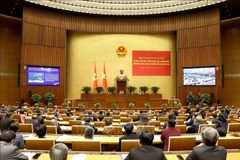
Central steering committee for sci-tech development, innovation, digital transformation set up
A decision on the formation of the Central Steering Committee for the Development of Science, Technology, Innovation and Digital Transformation was announced at a national conference held by the Politburo and the Party Central Committee’s Secretariat in Hanoi on January 13 morning.
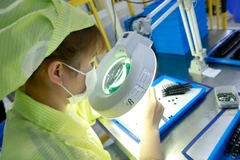
Da Nang’s digital transformation efforts on right track
The Da Nang Software Park No.2, which has been recognised by the Government as a concentrated information technology (IT) zone, will become operational within this month, according to Vice Chairman of the People’s Committee of the central city Tran Chi Cuong.
